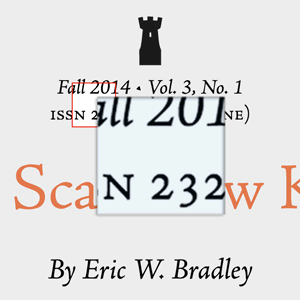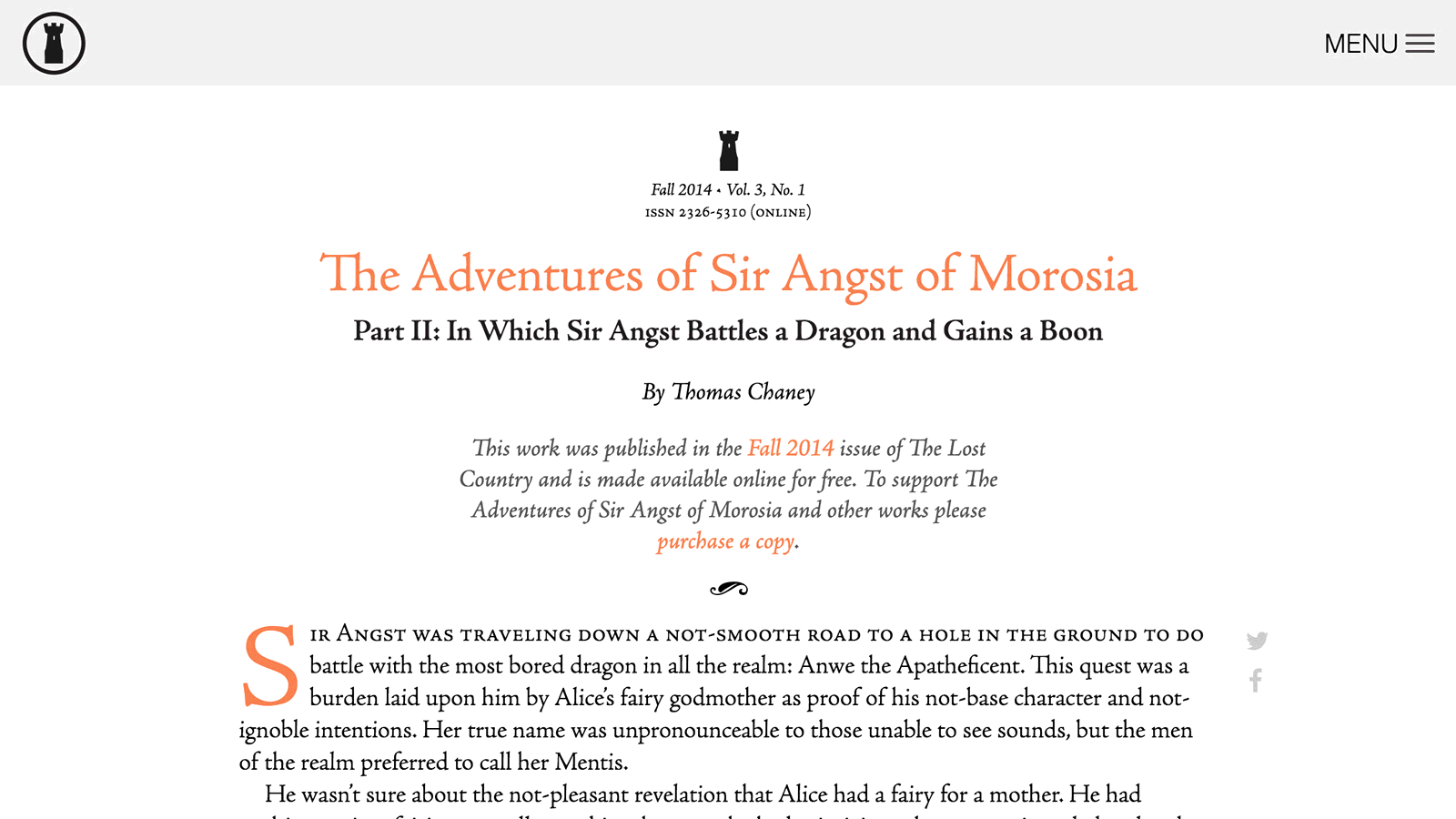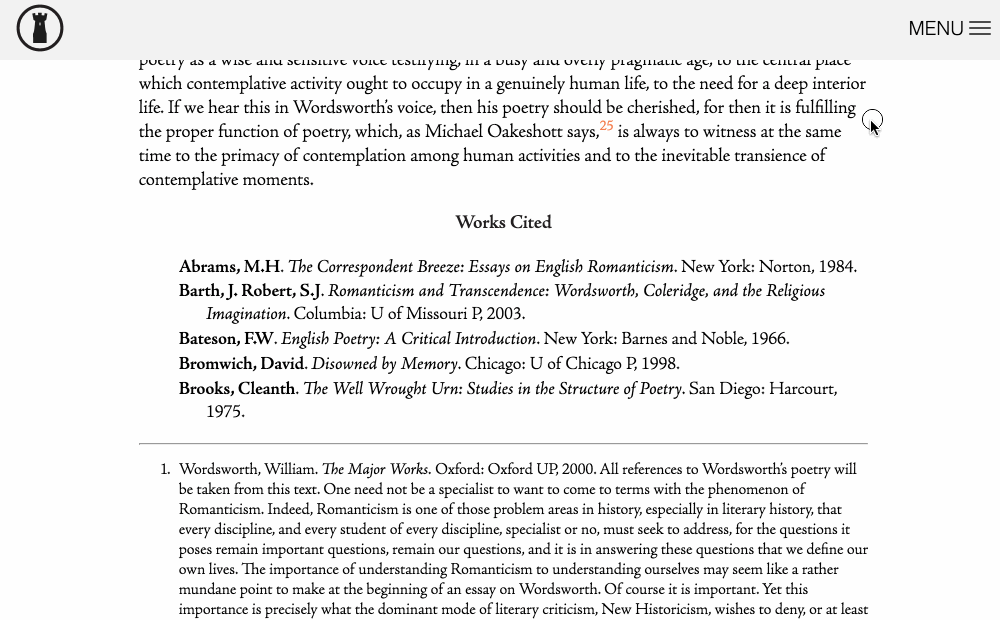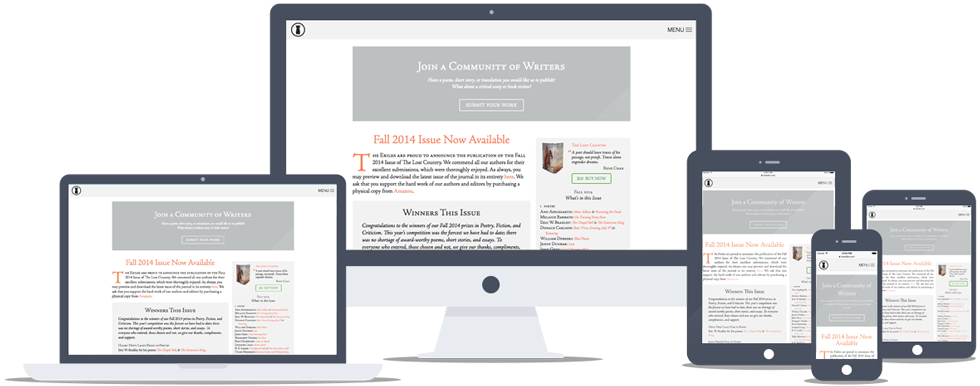Inside The Exiles Website
BRM Web Dev helped us establish a web presence and raise our online visibility. Our readership numbers are up. Our submissions are up. We couldn’t be happier.
The Exiles Editors
What The Client Needed
The Exiles is a literary group who publishes an annual literary journal, The Lost Country. Although The Exiles needed to display information about their organization, such as when and where meetings were, or how someone could donate, the primary purpose of the website was to house the online version of their publication. In addition to a website, The Exiles needed a more efficient way to manage their digital communications and documents.
After some discussion and anlysis, we came up with a few simple objectives:
The Objectives
- A simple, clean website which reflected the print origin of their publication.
- The website needed to be accessible on any device.
- They needed to collect subscriber information and to be able to send email campaigns to those subscribers.
- They needed a more efficient way to manage and preserve emails and documents.
- They needed a way to sell merchandise directly on their site.
And so with these goals in mind, we set out to build them their clean, responsive website.
How We Solved Their Problem
Fonts & Whitespace

The first step was to analyze the clients print publications so that we could reproduce the style and tone for their new website. Analysis of their traffic showed us that people came to the website primarily in order to read the online version of the journal. So, when we laid out the website we made sure that the publication was the primary focus, and that it was not cluttered by the often unnecessary asides and ads found on other publication websites. The focus was entirely on the work set before the reader. And because good typography was so important to this project, we used a service by Adobe called Typkit. Typekit allows us to embed professional grade fonts into our websites, including often advanced font-features such as ligatures and lowercase numbers. The font chosen was Minion Pro, a staple of many print designer’s arsenal.

Navigation
One of the usability problems with the old website was a lack of clear navigation. When we analyzed the visitor behavior flow, we found that visitors would often need to click through several pages to get what they were looking for. This was not ideal. In addition, we noticed that the longer pages of the website had a significantly higher exit rate than the shorter pages. This meant that visitors were frustrated that they had to scroll back to the top of the page in order to get to other content, and so they chose to leave the site instead.

There were three major changes to the menu which solved the navigation problem. The first was to simplify the navigation path by providing direct links to each of the primary sections of the website. Each section, then, was able to direct a visitor to the sort of content that he or she was looking for, whether this was the latest poem, or the location of the next event. The second change was to affix the menu to the top of the page, so that it was always available, no matter how far someone had scrolled. The last change we made was to present the menu as a full-screen overly. This reduced confusion and allowed a visitor to select a link with confidence. With the new navigation all visitors are only 1-click away from important actions, such as making a purchase.
Social Media Integration
While The Exiles already had an active Twitter and Facebook account, they had trouble with social engagement. Much of what they posted went unnoticed and unread. We restructure their social media marketing strategy to encourage growth and user engagement, integrating Twitter Cards, and including rich media in every tweet and Facebook post. Since they have implemented our strategy, their social engagement has more than doubled.
Site Analytics & Mailing Lists
The Exiles needed an efficient way to collect visitor statistics and to collate subscriber information. But collecting the data was only half the battle. It did them no good to have a giant spreedsheet, unless they were somehow able to use that data. What they really wanted wasn’t data, it was to make chanages based on visitor tendencies, or to send subscribers updates about new and upcoming information.
Analytics with Google Analytics
Google Analytics is a free analytics solution by Google which allows organizations to turn insights about visitor behavior into actionable solutions. Using Google Analytics The Exiles are able to determine the following important information about their visitors:
- Determine what technologies visitors used to read the online publication, such as the device and browser.
- Determine the geo-data of visitors, such as their location and language.
- Determine the behavior of visitors. How many return to the website? Which content do they engage, and in what order?
- Determine the source of traffic. Who referred the visitor, or did the visitor type the URL into the browser?
Manage Subscribers with Mailchimp
Mailchimp is an email marketing platform used to manage contacts, send emails, and to track results. With Mailchimp, The Exiles is able to:
- Maintain a profile on each subscriber, including which publications they have purchased, or what interests they have.
- Easily create automated email campaigns.
- Generate reports on who has opened an email, what links they clicked, and how much of the email they have read.
Google Apps for Work
Communication and collaboration among the various editors was critical for meeting the strict deadlines of publication. Documents needed to be created, shared, edited, re-shared, re-edited, and so on. Emails needed to be sent, and saved indefinitely. Events needed to be scheduled and disseminated. And all this needed to happen easily and without much effort.
Enter Google Apps for Work. We set up The Exiles with a Google Apps for Work account, creating customs emails (@yourdomain.com) for each user and ensuring that all communication was archived, preserved, and easily retrieved. Using the Productivity Suite, The Exiles were also able to create and collaborate in real-time on word processing and spreadsheet documents. There was no more forgetting to attach a document to an email, or updating an old version. With Google Docs, every user always had the most recent, up-to-date version, and a complete revision history so they could review any changes that were introduced.
Sales & Payment Processors
The Exiles needed an easy way for visitors to purchase copies of the journal and other merchandise. The logistics were two-fold. First, they needed to accept transactions, and second, they needed an easy way to catalogue and track all the transactions that had been made so that they could manage inventory and ship products. For a payment processor, we integrated their website with Stripe, which has a rock-solid API for developers and an intuit user-friendly interface for The Exiles team.
But accepting payments was just half the battle. Once a payment was made, The Exiles still had to make a list of all the orders made that day, package the journals or other merchandise, and head to the Post Office in order to pay for shipping. That’s pretty burdensome. So we helped them programatically generate shipping labels using an API service called EasyPost. With EasyPost, we were able to automate the shipping processes. Whenever a The Exiles accept a shippable transaction, a shipping label is automatically generated and paid for. Now, all The Exiles need to do is attach the pre-printed lable to the merchandise, and set the package in the out-going mail. Simple. Easy. Effecient.
The Technology Roundup
Web Hosting
The Exiles website is hosted on Heroku, a cloud PaaS. Heroku allows the website to be deployed quickly and reliably. That leaves more time for development and later finer-tuning.>
Languages
The Exiles website was built using Python, allowing us to take advantage of its expansive libraries. Simple syntax makes coding faster and allows us to minimize long-term technical debt.
Frameworks
The Exiles website is built upon the Flask Micro Framework. This powerful framework gave us the means to create a highly customized and effecient web application.
Cloud Services
The Exiles uses Google Apps for Work, including Gmail, Docs, and Drive. Collaboration, communication, and productivity are more efficient with Google Apps. Tasks such as reviewing submissions became less daunting.
Analytics
The Exiles website incorporates Google Analytics to gather visitor statistics. Growth and new interest are exceedingly important and easily tracked with Google Analytics. We also gather analytics on their social media campaigns.
Web Hosting
The Exiles uses Amazon S3, a scalable and reliable way to host static files. Amazon’s fast delivery interface makes serving the files simple. Also, versioning allows us to track changes to assets over time.
